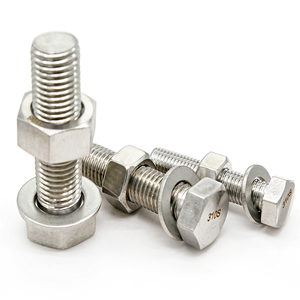

Ss Bolts M14 Stainless Steel And Nut M12 Washer M10x125 Inox 303 Head Hollow A4 304 316 Nuts 316L 310 410 310S Hex Bolt

Carbon Steel And Stainless Steel Hose Fitting Hydraulic Connector M22 Ball Head Banjo Bolt And Fitting 70011





















A banjo bolt is a specialized bolt commonly used in hydraulic brake systems and fluid connections in various automotive and machinery applications. It plays a crucial role in attaching brake lines, hoses, or other hydraulic components to master cylinders, calipers, or wheel cylinders. The distinctive feature of a banjo bolt is the presence of a hole through its center and a hollow cylindrical section near the head.
Banjo bolts are available in various sizes to cater to the diverse needs of hydraulic systems, providing flexibility in designing and assembling fluid connections. The 6mm banjo bolt is commonly used in applications where space is limited and a more compact hydraulic connection is required. Its smaller diameter makes it suitable for motorcycles, scooters, or other systems with tight constraints, ensuring efficient fluid transfer without compromising on performance. The 8mm banjo bolt, another compact size, is frequently employed in smaller hydraulic setups, offering versatility for various applications where space considerations are critical. These smaller sizes showcase the adaptability of banjo bolts in accommodating the spatial constraints of different systems.
Moving to mid-range sizes, the 10mm and 12mm banjo bolts strike a balance between compactness and fluid flow capacity. The 10mm banjo bolts are widely utilized in automotive brake systems, motorcycles, and other applications where a moderate flow of hydraulic fluid is required. The 12mm banjo bolt, slightly larger in diameter, finds its place in applications that demand a higher fluid flow rate. These mid-sized banjo bolts offer versatility in connecting hydraulic components, making them suitable for a range of industries and machinery. Finally, the 14mm banjo bolt, on the larger end of the spectrum, is employed in heavy-duty machinery, industrial equipment, and larger hydraulic systems. The increased diameter of the banjo bolt 14mm variants allows for efficient fluid transfer in applications where a substantial volume of hydraulic fluid needs to be conveyed.
Banjo bolts find widespread applications in hydraulic systems across various industries, where secure and efficient fluid connections are essential. One primary application is in automotive braking systems. Banjo bolts play a crucial role in connecting brake lines and hoses to components like master cylinders, calipers, or wheel cylinders. The hollow design of the banjo bolt enables the flow of hydraulic fluid between these components. The sealed connection created by banjo bolts is vital for maintaining brake system integrity, preventing leaks, and facilitating the transmission of hydraulic pressure that enables effective braking performance. Whether in cars, trucks, or motorcycles, banjo bolts contribute to the safety and reliability of vehicle braking systems.
In addition to automotive applications, banjo bolts are extensively used in various hydraulic systems beyond the realm of transportation. Industries such as construction, agriculture, and manufacturing leverage the versatility of banjo bolts for connecting hydraulic lines in heavy machinery, equipment, and industrial processes. Hydraulic clutches in motorcycles and some vehicles also utilize banjo bolts to establish fluid connections between different components, contributing to smooth and efficient clutch operation. The adaptability of banjo bolts extends to hydraulic systems in marine environments, where they are employed in boats and ships for reliable fluid connections in steering systems and other critical applications.